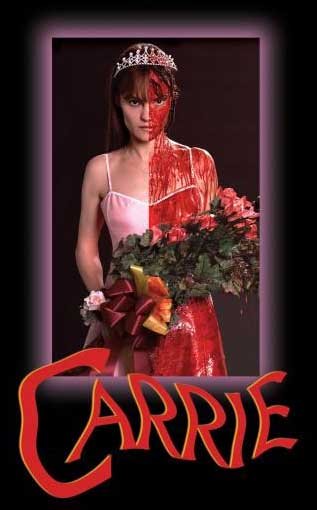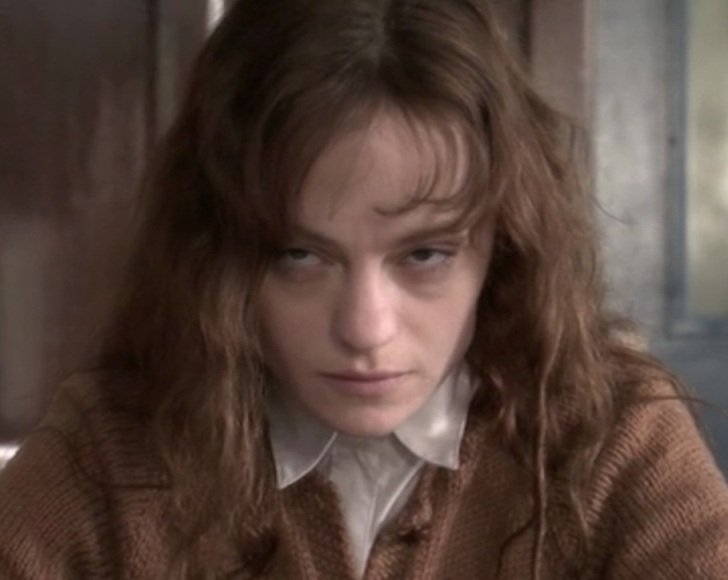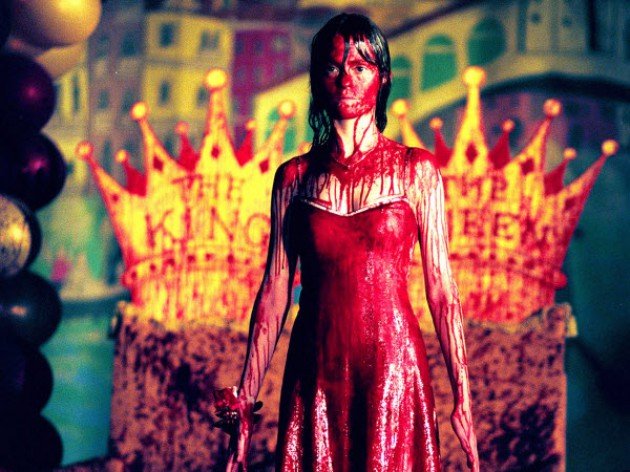CARRIE (2002): Telekinesis For The T.V. Viewer
Stephen King's original string of mid '70s-to-mid '80s horror novels have maintained such popularity that some have been adapted more than once. His debut novel Carrie is a perfect example - this tale of teen telekinesis has been adapted three times, two of them for the big screen in 1976 and 2013. Between its two big screen appearances, Carrie was revived as a miniseries-style event for television in 2002. The results use their television-allotted length in ways that both help and hurt its approach to the source material. The plot of the television version leans hard on the novel's melodrama aspects. A new framing device depicts survivors of a small town catastrophe being interviewed by cop Mulchaey (David Keith), who is trying to piece together what might have caused these events. As he interviews survivors, his suspicion falls on Sue Snell (Kandyse McClure), a teen who at first pranked then later befriended Carrie White (Angela Bettis). Carrie is the school outcast, a misfit who lives with her religious zealot mom, Margaret (Patricia Clarkson).Mulchaey suspects that Snell teamed up with the school's resident mean girl Chris Hargensen (Emilie De Raven) to pull a nasty prank on Carrie but the accounts of Snell and her fellow survivors paint a different picture. It seems that Chris had it in for Carrie but Sue tried to help Carrie's self-esteem by lining up a prom date for her using her own beau, Tommy Ross (Tobias Mehler). Neither knows that Carrie has a burgeoning power of telekinesis - and when she's pushed too far, those powers have the ability to do more damage than anyone can conceive of.The 2002 version of Carrie is both helped and hurt by the sprawl of its two hour-plus running time. On the good side, this allows it to work in some good material from the novel that the 1976 film couldn't accommodate, like a memorable flashback to Carrie's childhood that gives an early indication of her abilities and the expanded version of Carrie's town-wide rampage that the first film version had to avoid for budgetary reasons. However, the expanded length also bleeds a lot of the tension out of the story's buildup, especially with the framing device frequently interrupting and trying to build suspense for a story that all the King fans who might watch this already know. There's also a dopey coda designed to leave room for a weekly t.v. show.
The plot of the television version leans hard on the novel's melodrama aspects. A new framing device depicts survivors of a small town catastrophe being interviewed by cop Mulchaey (David Keith), who is trying to piece together what might have caused these events. As he interviews survivors, his suspicion falls on Sue Snell (Kandyse McClure), a teen who at first pranked then later befriended Carrie White (Angela Bettis). Carrie is the school outcast, a misfit who lives with her religious zealot mom, Margaret (Patricia Clarkson).Mulchaey suspects that Snell teamed up with the school's resident mean girl Chris Hargensen (Emilie De Raven) to pull a nasty prank on Carrie but the accounts of Snell and her fellow survivors paint a different picture. It seems that Chris had it in for Carrie but Sue tried to help Carrie's self-esteem by lining up a prom date for her using her own beau, Tommy Ross (Tobias Mehler). Neither knows that Carrie has a burgeoning power of telekinesis - and when she's pushed too far, those powers have the ability to do more damage than anyone can conceive of.The 2002 version of Carrie is both helped and hurt by the sprawl of its two hour-plus running time. On the good side, this allows it to work in some good material from the novel that the 1976 film couldn't accommodate, like a memorable flashback to Carrie's childhood that gives an early indication of her abilities and the expanded version of Carrie's town-wide rampage that the first film version had to avoid for budgetary reasons. However, the expanded length also bleeds a lot of the tension out of the story's buildup, especially with the framing device frequently interrupting and trying to build suspense for a story that all the King fans who might watch this already know. There's also a dopey coda designed to leave room for a weekly t.v. show. The 2002 Carrie also suffers in comparison to its cinematic predecessor because of its t.v. limitations. It has to pull its punches in the story's more disturbing moments, particularly the traumatic locker-room opening. The visual effects allow the film to have a greater scope when depicting the climactic carnage but the CGI is hit and miss - and the t.v. version also has the tendency to overstate certain moments because it can use visual effects (instead of knocking a teasing kid of his bike, Carrie makes him fly several feet through the air and crash into a tree!).Most importantly, the t.v. version looks a bit "plain Jane" in terms of style when compared to the pop-gothic style of the DePalma film. Director David Carson does his best to bring style to the film on a t.v. schedule and budget but his efforts come up short compared to DePalma's kinetic flair, particularly in the handful of scenes that the t.v. version does a replay version of. For proof, look no further than the prom setpiece: though tarted up with au-courant CGI effects, its staging lacks the punch and slick orche
The 2002 Carrie also suffers in comparison to its cinematic predecessor because of its t.v. limitations. It has to pull its punches in the story's more disturbing moments, particularly the traumatic locker-room opening. The visual effects allow the film to have a greater scope when depicting the climactic carnage but the CGI is hit and miss - and the t.v. version also has the tendency to overstate certain moments because it can use visual effects (instead of knocking a teasing kid of his bike, Carrie makes him fly several feet through the air and crash into a tree!).Most importantly, the t.v. version looks a bit "plain Jane" in terms of style when compared to the pop-gothic style of the DePalma film. Director David Carson does his best to bring style to the film on a t.v. schedule and budget but his efforts come up short compared to DePalma's kinetic flair, particularly in the handful of scenes that the t.v. version does a replay version of. For proof, look no further than the prom setpiece: though tarted up with au-courant CGI effects, its staging lacks the punch and slick orche stration of the 1976 version.On the positive side, the 2002 Carrie does have a few nice attributes. Bettis delivers a superb performance in the title role, bringing a convincing awkwardness and vulnerability that really sells the story, and Clarkson does well by underplaying her mean mom role to create a subtle sense of menace. A lot of the supporting teen cast is bland, particularly the interchangeable male actors, but McClure and De Raven acquit themselves well enough and Keith gives a likeable, committed performance as the cop.It's also worth noting that the script by Bryan Fuller, who would later create Hannibal, writes some effective dialogue, particularly when he is able to step away from the familiar plot. Highlights include a confrontation between the principal and an angry parent and a great moment where Carrie tells Sue she knows Sue just feels pity for her but appreciates her kindness nonetheless. If he'd been able to color outside the lines like this more often, this version of Carrie would have been better. Nonetheless, the skill he shows with reinventing familiar material in these moments hints at his future success with Hannibal.Ultimately, this television version of Carrie is a mixed bag but it offers enough interesting moments and strong lead performances to make it worth a look for King completists who can keep their expectations in check.
stration of the 1976 version.On the positive side, the 2002 Carrie does have a few nice attributes. Bettis delivers a superb performance in the title role, bringing a convincing awkwardness and vulnerability that really sells the story, and Clarkson does well by underplaying her mean mom role to create a subtle sense of menace. A lot of the supporting teen cast is bland, particularly the interchangeable male actors, but McClure and De Raven acquit themselves well enough and Keith gives a likeable, committed performance as the cop.It's also worth noting that the script by Bryan Fuller, who would later create Hannibal, writes some effective dialogue, particularly when he is able to step away from the familiar plot. Highlights include a confrontation between the principal and an angry parent and a great moment where Carrie tells Sue she knows Sue just feels pity for her but appreciates her kindness nonetheless. If he'd been able to color outside the lines like this more often, this version of Carrie would have been better. Nonetheless, the skill he shows with reinventing familiar material in these moments hints at his future success with Hannibal.Ultimately, this television version of Carrie is a mixed bag but it offers enough interesting moments and strong lead performances to make it worth a look for King completists who can keep their expectations in check.


